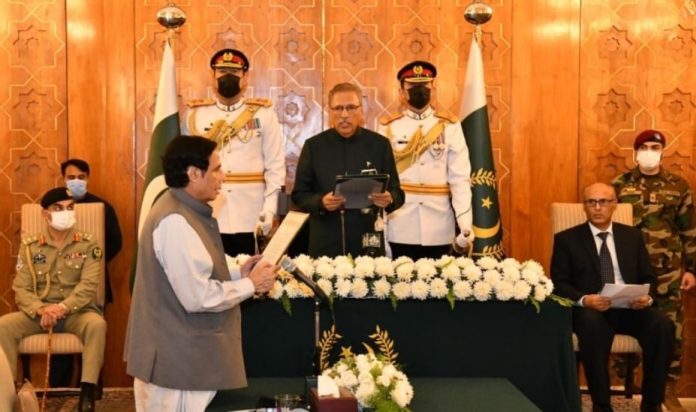• President administers oath to Elahi after refusal by Punjab governor
• All actions taken by outgoing CM are of no legal effect
ISLAMABAD, JUL 27: In a decision that was awaited with bated breath by political observers, the media and all the parties involved, the Supreme Court late on Tuesday declared Chaudhry Parvez Elahi as the duly elected chief minister of Punjab for securing 186 votes against the 179 of his opponent, PML-N’s Hamza Shehbaz, in the July 22 run-off poll for the coveted office of the province.
Later, in the small hours of Wednesday morning, President Dr Arif Alvi administered the oath to CM-designate Elahi at Aiwan-i-Sadr in Islamabad. Mr Elahi had to rush from Lahore to the federal capital after Punjab Governor Balighur Rehman refused to carry out the job.
Earlier when the short order was pronounced by Chief Justice of Pakistan (CJP) Umar Ata Bandial, Moonis Elahi, a son of the petitioner Parvez Elahi, was surrounded by PTI and PML-Q supporters and lawyers in courtroom No 1 to congratulate him. PTI senior leaders, including Shah Mahmood Qureshi, Asad Umar, Fawad Chaudhry, also accompanied former minister Moonis.
The CJP-led three-judge bench, also comprising Justice Ijazul Ahsan and Justice Munib Akhtar, announced the judgement in the absence of counsel for the respondent ruling coalition parties, who had during the proceedings earlier in the day informed the court that on the instructions of their clients, they were boycotting the hearing. Their clients intended to move a review petition against the court’s Monday decision of declining their request for a full court to hear Mr Elahi’s petition against the rejection of 10 votes of PML-Q lawmakers polled in his favour during the CM’s election in the Punjab Assembly on July 22.
Soon after the verdict was announced, a jubilant crowd carrying PTI flags present outside the Supreme Court on the Constitution Avenue as well as a number of supporters on the premises burst into cheers and sloganeering. Despite a heavy police contingent blocking the roads leading to the apex court building, a large number of supporters managed to reach the venue, and those who could not make it started celebrating at different police pickets on the way.
Announced around 9pm on Tuesday, the short order also set aside the July 22 ruling of Punjab Assembly Deputy Speaker Dost Mohammad Mazari and declared it void, without lawful authority and of no legal effect. Earlier, the hearing had commenced at 11:30am and continued until 9:15pm with two breaks.
Authored by the CJP, the short order also ordered the Punjab chief secretary to immediately issue the requisite notification declaring the petitioner as the duly elected CM. It added that Hamza Shehbaz was not a duly elected CM, the oath of office administered to him was without lawful authority and of no legal effect.
Moreover, all acts, deeds and things attendant and consequent upon the oath, including but not limited to the notification of Hamza and the formation and swearing-in of the cabinet on his advice, was also declared to be without lawful authority and of no legal effect.
Similarly, all advisers, special advisers and special assistants appointed under the orders or advice of Hamza would immediately cease to hold office, their appointment declared illegal and without lawful authority and the ministers appointed on his advice were relieved of their offices/posts with immediate effect, the 11-page order stated.
The Supreme Court also directed Punjab Governor Balighur Rehman to administer the oath of office to Parvez Elahi in accordance with law and Constitution not later than 11:30pm on Tuesday. And in case the governor was unable or unwilling to do so, President Alvi could carry out the job. The order added that all acts, deeds and things lawfully done or purported to be done by Hamza, or any member of the provincial cabinet, in accordance with the Constitution and law had been saved and protected under the de facto doctrine, subject to all just and legal exceptions and such review, modification, reversal or withdrawal as may be deemed appropriate by the incoming chief minister and any member of the cabinet or other officer appointed by him.
The short order also mentioned that the sole question of public importance with reference to enforcement of fundamental rights involved in the petition was whether the understanding and implementation of the SC’s May 17 short judgement in the presidential reference read with Article 63A(1)(b) was correct.
“We find that the understanding and implementation of the said short judgement as well as the provisions of Article 63A(1)(b) of the Constitution by the Punjab Assembly deputy speaker was patently incorrect and erroneous and cannot be sustained. Thus, the governance of the Punjab in accordance with the Constitution was subverted whereby the fundamental rights of the people have been seriously infringed,” it added.
The court office was also asked to communicate/transmit a copy of the short order to the Punjab governor, assembly deputy speaker as well as chief secretary for implementation and compliance. It also mentioned the objection raised by the ruling parties’ counsel to hearing of the petition by the three-judge bench, and sought referral to the full court, which the bench had declined on Monday.
The respondents’ counsel also laid out their case on the merits of the dispute, which essentially concerned a question of law touching the formation of the provincial government allegedly in violation of the provisions of the Constitution, in particular Article 63A read with Article 130(4), the short order stated.
Although elaborate submissions were made on Monday, the respondents’ counsel requested for further time to make additional submissions and seek instructions, it added.
During the hearing, Parvez Elahi was represented by Barrister Syed Ali Zafar, Imtiaz Rashid Siddiqui and Faisal Fareed etc. Whereas Irfan Qadir appeared on behalf of the deputy speaker, Mansoor Usman Awan represented Hamza Shehbaz, Farooq H Naek PPPP and Salahuddin Ahmed Chaudhry Shujaat Hussain.

















